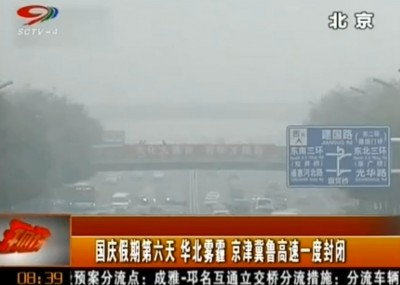This post is part of our ongoing special coverage China's Pollution Problem.

In this screen capture from Youku, smog engulfed northern China during the October national holiday.
Heavy smog in northern China during the seven-day national holiday resulted in the shut down of more than 30 highways and a number of airport in Beijing and its surrounding areas.
To address public grievances and frustrations, the Chinese authorities reintroduced its three- to five-year plan to monitor air quality under the Air Pollution Control Program, which has been unveiled earlier in September. However, netizens are getting impatient with the situation: instead of monitoring, why not address the root cause?
The Chinese Center For Disease Control and Prevention said the nationwide monitoring network would be built within the next three to five years. The system will be charged with establishing correlations between air pollution and people's heath, and the first batch of the monitoring sites, a total of 43 and all in smog-prone provinces, will be put to work this year.
People are rather skeptical of the monitoring system. Hanlei Qiu Baoyang, who lives in Beijing, questioned on popular Chinese microblogging site Sina Weibo if the monitoring network would really solve the air problems:
3-5年只是建立一个监测的。是不是还得10年去控制?对中国只能说呵呵了
We are going to spend the next three to five years merely setting up monitoring [system]. Are we going to spend another ten years controlling [the pollution]? China, I offer no comments.
Equally skeptical is “Shenyang Jixiangzi”, a resident from China's northeastern city of Shenyang. He wrote:
真不可思议啊,检测的数值明明都已经爆表了,却还说要等5年建立一个检测网络。请问有关部门是不是还需要10年后才考虑建立一个管理机制、15年后考虑建立一个考核机制,20年后考虑建立一个监管考核机制……,到最后都没有惩罚机制的考虑。
Unbelievable, even with the [air pollution] index already off the charts, they still talk about spending five years to build a monitoring network. May I ask relevant departments, do you still need ten years to build an administrative mechanism, 15 years to build an appraisal mechanism, 20 years to build a supervisory mechanism….., in the end, there will be no consideration for punitive mechanism.
“YiZhi Xianren”, a sales manager in southwestern city of Chengdu, roared:
我国今年雾霾影响人口约6亿。自杀行为,原由在哪儿?谁该为此负责??能不能及时刹车,根本治理??
The smog in our country this year has affected nearly 600 million people. [It is equivalent to] suicide. What was the reason behind it? Who should be held accountable?? Can we put a stop to it and get rid of it in a fundamental way??
Studies have already established the negative effect of air pollution on health. A recent study published by the National Academy of Sciences indicated that a person living in the north of China has a life expectancy cut short by five and a half years because of pollution. According to Xu Donggun, an official with the Chinese Center for Disease Control and Prevention, the lingering smog in 2013 has affected 17 provinces in China and 600 million people – nearly half the nation's population.
To tackle the situation, the State Council announced in June a set of initiatives to combat pollution, including improvements in vehicle fuel quality, downsizing the high-polluting industrial sectors, and a shifting toward renewable energy sources. The plan has been consolidated into the 2013 to 2017 “Air Pollution Control Program” released by the State Council in September 2013. The program, which will cost 1.7 trillion yuan (about 278 billion US dollars), set [zh] an ambitious target to cut PM2.5, fine particles most detrimental to human lungs, by 25 percent by 2017 in Beijing and its neighboring areas.
Back in January of this year, the US Embassy in Beijing announced on Twitter that the PM2.5 level was “beyond index”, which means a reading above 500. According to the Environmental Protection Agency, people should avoid outdoor activity at the levels between 301 and 500. A New York Times reporter compared the over 500 record-breaking hazardous level to an airport smokers’ lounge.
More netizens commented sarcastically about the travel chaos caused by smog during the recent national holiday. Yaochen, a Chinese mainland actress who is followed by 50 million Weibo users, wrote in mockery:
国庆长假期间,北京车辆稀少,市内道路畅通,呛人雾霾依旧。”主要污染源是机动车” 的谣言不攻自破,机动车终于得以沉冤昭雪…
During the long national holiday, there were few vehicles on the roads of Beijing, the traffic in the city was smooth, but still [the air] was smoggy and suffocating. The rumour that “vehicles are the main polluters” does not hold water, vehicles have been redressed and spared of injustice.
It is clear the the pollution is related with the pursuit of GDP growth, Shanghai resident Chai Xiaowei wrote, spelling out the relationship between smog and the Chinese economy:
雾霾成常态后下的中国,汽车消费的不可阻挡,环保、医药、新能源行业趋势向好,提升行业估值。
China, under the norm of smoggy weather, opens a straight road for car consumption and industries like environmental protection, medicine, new energy have got bright futures, there will be increased value in those industries.
This post is part of our ongoing special coverage China's Pollution Problem.







1 comment